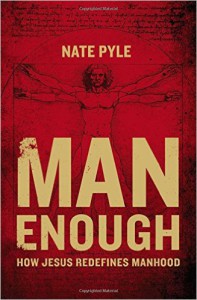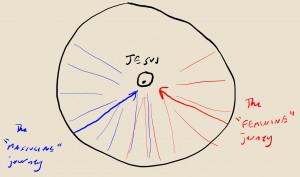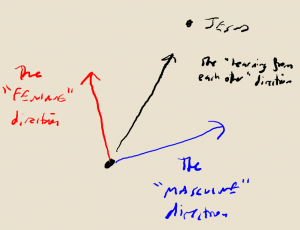Review: Man Enough: How Jesus Redefines Manhood
 I’ve read many books that seek to present a biblical view of manhood. We are not the first era to have waning numbers of men at church. Recent solutions for ecclesial emasculation have tended to range from exegetical insipidity to testicular ferocity. All fall short. Nevertheless, I was looking forward to reading this very recent contribution from Christian blogger, Nate Pyle. Pyle also falls short, but he comes the closest I’ve seen.
I’ve read many books that seek to present a biblical view of manhood. We are not the first era to have waning numbers of men at church. Recent solutions for ecclesial emasculation have tended to range from exegetical insipidity to testicular ferocity. All fall short. Nevertheless, I was looking forward to reading this very recent contribution from Christian blogger, Nate Pyle. Pyle also falls short, but he comes the closest I’ve seen.
This is because Pyle takes a firm Christocentric approach. The goal of the human life is not to be more “manly” (or more “ladylike”) but to be more like Jesus. “Jesus is calling men and women to become more wholly human” (p156).
Pyle’s approach is therefore not only well grounded but also very useful. He can talk about the weakness, pain, vulnerability, and integrity of Jesus. All men must encounter such things, and embrace them healthily, in order to mature as a person, and therefore as a man. This is great stuff. When I think of the “strong” men that I want to emulate, I think of those who find strength in weakness, embrace the pain of life and persist, who are open and vulnerable, and who have the integrity of being the same person in all circumstances. When I counsel myself, or others, it is areas like these that need to be confronted: don’t do the bravado thing, don’t turn pain into anger, don’t run away in fear, don’t divide your life with false comfort and sin.
The book is therefore rich and applicable. It balances the “American Christian Man” caricature which is (as I have discovered about most American caricatures) not caricature but disconcerting reality. The MMA-loving, Promise-Keeping™, Courageous™, Man of God urging his brothers to “man up” while backdropped by ammo boxes and warplanes may work for some, but is unhelpful, at best, for many others. At worst this caricature turns being a husband into not much more than “looking after the little lady” and links male human value with some narrow form of productivity. Gladly, Pyle, is much more in tune with the real world.
It is unfortunate, therefore, that he couldn’t have been slightly more coherent in his pursuit. He runs into, and doesn’t overcome, an age-old problem. I encountered it for myself when training as a preacher. We were encouraged to present sermons that were accessible to both men and women. But what does that mean? Should I use illustrations that cross the full-range of stereotypes; should I make an equal number of references to knitting compared to football? Or should I simply presume that both men and women would have the wits to understand and dissect whatever point I was trying to make in the way I was trying to make it? 99% of the time I choose the second option which doesn’t play the gender game, but ignores it, which is the point. But Nathan Pyle has written a book about masculinity and also doesn’t want to play the game. And this is the problem: he wants to engage the issue of manhood, but spends the whole time hovering around without landing on the heart of the issue.
On the one hand “masculinity” is for Pyle the caricature that he wants to avoid. Therefore he is at pains to show that “nowhere does the Bible say that Jesus came to model masculinity” (p92). On the other hand, Jesus is the model human, whom men are called to imitate, who exhibits “both feminine and masculine characteristics” (p93). So does Jesus encapsulate masculinity or not? Is he redefining masculinity, or is he transcending it? Does the goal of becoming more wholly human mean denying my masculinity, or embracing my femininity, or does it mean redefining masculinity in terms of the balance? Pyle never gets his semantics locked down.
Masculine characteristics (“Men love to be agents of change in the world” (p160)) are sometimes presumed, sometimes belittled, other times embraced by Pyle. Sometimes they are simply dismissed as being not something that a woman couldn’t also exhibit. Nothing he says is wrong, its just that he mixes and matches his observation, articulation, rejection and aspiration of the masculine without bringing it together. It’s great that Jesus is our goal, but why are men like men, and what particular issues might they face in seeking their goal? It’s not enough for him to throw his hands in the air, as he does, and say “it’s complex.” That’s not why I bought the book! I can do that myself!
Having said that, Pyle has made me think my own thoughts. In particular he clears the ground for what might be called vector complementarianism which goes like this: Let us not define gender in terms of characteristics (that can happen, but it’s secondary and therefore very blurry).  Rather, if being wholly human is our goal, and if that goal is centred on Jesus Christ, then let us consider gender differences in terms of direction.
Rather, if being wholly human is our goal, and if that goal is centred on Jesus Christ, then let us consider gender differences in terms of direction.  In general, men and women will grow towards Christ in different directions, like radials of a circle approaching the centre. Men and women do not absolutely need each other in order to do this, but the propensities of one, added to (not eliminating) the propensities of the other can result in a Christward direction. That’s something to work on.
In general, men and women will grow towards Christ in different directions, like radials of a circle approaching the centre. Men and women do not absolutely need each other in order to do this, but the propensities of one, added to (not eliminating) the propensities of the other can result in a Christward direction. That’s something to work on.
![]() Review: Man Enough: How Jesus Redefines Manhood by Will Briggs is licensed under a Creative Commons Attribution-NonCommercial-ShareAlike 4.0 International License.
Review: Man Enough: How Jesus Redefines Manhood by Will Briggs is licensed under a Creative Commons Attribution-NonCommercial-ShareAlike 4.0 International License.


